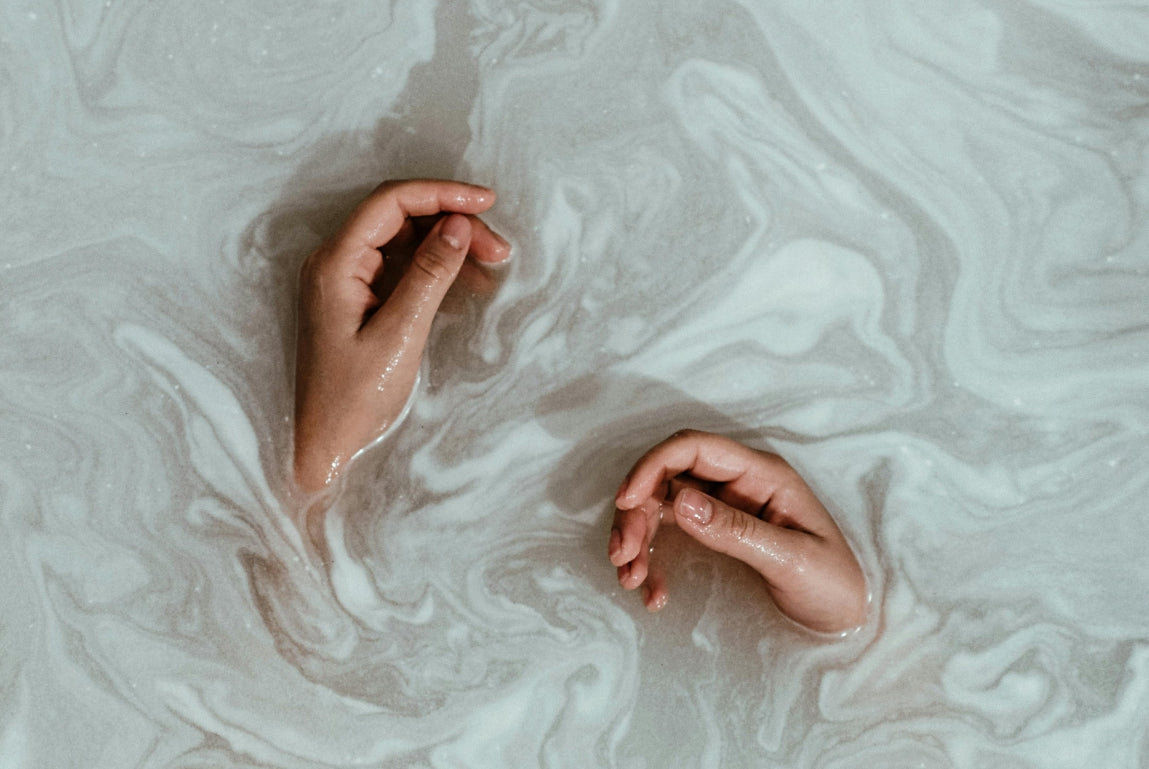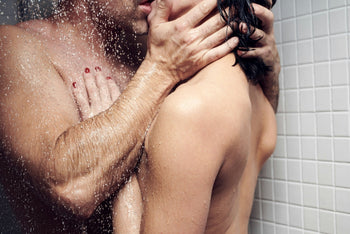

Table of Contents
Key Takeaways
Mud baths can raise scrotal temperature and reduce sperm quality temporarily.
Phytoestrogens and heavy metals in spa mud are worth monitoring—ask your spa for safety documentation.
Some evidence suggests female fertility may benefit, but the data is anecdotal and inconclusive.
Mud therapy may reduce stress, enhance libido, and support indirect fertility through overall wellness.
If you’re actively trying to conceive, be strategic about your spa timing and keep the mud off your parts.
Mud, Myths, and Your Reproductive Mojo
Somewhere between clinical trials and TikTok testimonials lies the steamy world of mud baths. One moment you're at a resort, slathered in mineral-rich sludge, channeling your inner muddy Adonis (or inner sea goddess). The next, you're panicking that your scrotum just hit hot tub temps and fried your fertility.
Whether you’re trying to make a baby or just keep your bits biologically spry, you’ve probably wondered: Mud baths and fertility - do they improve it, wreck it, or are they just a spa scam that smells vaguely of sulfur and wishful thinking?
Let’s get dirty—in the most biologically educational way possible.
Mud Therapy 101: What the Sludge Is Actually Doing
A therapeutic mud bath (aka peloid therapy or balneotherapy, if you’re fancy) usually involves soaking your body—or your nether regions—in warm, mineral-loaded clay or peat for about 15 to 30 minutes. The mud types vary, but we’re talking about everything from Romanian lake gunk to volcanic ash from New Zealand.
So what’s happening to your body in that tub of heated Earth goo?
Heat exposure : Your body temperature rises, and if the groin’s involved, so does the risk to sperm.
Pressure : The heavy, warm sludge exerts physical pressure on your limbs and pelvis.
Chemical absorption : Minerals and organic compounds may soak into your skin like a weird, warm smoothie.
Sounds spa-chic. But what about your reproductive bits?
Heat and Testicles: It’s Not a Love Story
Your testes are temperature-sensitive little guys. They’re built to operate slightly cooler than the rest of your body—about 2 to 3°C cooler, to be exact. Heat them up, and they start acting out like toddlers with no nap.
Here’s what the science says:
Every 1°C increase in scrotal temperature can drop sperm count by about 15% .
Spermatogenesis slows.
DNA fragmentation increases.
Motility takes a nosedive.
And recovery? That can take up to three months, because that's how long one sperm production cycle lasts. So if you’re mudding your man-parts at 42°C, you’re basically giving your sperm a hot yoga class they didn’t sign up for.
Mud Baths and Sperm Health: The Short-Term Chill
Studies show that after just one mud bath, sperm concentration and motility can dip for a few weeks. Add daily sessions for 10 days (like some European spas prescribe), and you might see your sperm count drop into borderline sub-fertile territory.
So while it’s not a full-on sperm apocalypse, your little swimmers definitely aren't loving the heat.
Slippery Substances: What’s Lurking in the Mud?
Let’s talk about the chemical cocktail in your average spa mud. Some of it’s natural and potentially beneficial—like magnesium and humic acid. Other bits... not so much.
You might also be soaking up:
Heavy metals : arsenic, lead, mercury (yes, really)
Phthalates and hydrocarbons : from storage containers or the mud itself
Phytoestrogens : plant-based compounds that mimic estrogen
So while your spa brochure brags about “detoxifying” your body, you might be unintentionally marinating in hormone disruptors. Studies are mixed, but the concerns aren’t totally out there—especially if you’re already walking the fertility tightrope.
Heat Isn’t Always the Villain (Kind Of)
There’s a silver lining in all this spa heat. Mild heat stress can trigger your body’s antioxidant defenses —a little thing called hormesis. Some people report pain relief, better blood flow, and reduced inflammation after mud therapy.
Does that mean your swimmers are safe if you’ve got enough vitamin C in your system? Not quite—but antioxidants can help offset damage from oxidative stress, which is one of the biggest culprits when sperm quality tanks.
Ladies in the Mud: Hype or Help?
So mud might not be your guy’s best bet if you’re trying to conceive—but what about women?
In Central and Eastern Europe, gynecologists still occasionally prescribe heated mud wraps and even “peat tampons” (yes, that's a thing) to increase uterine blood flow or reduce inflammation. Some observational studies report:
Reduced pelvic pain
More regular cycles
Improved blood flow to the uterus
But here’s the rub: no solid, randomized trials show that mud directly boosts conception rates. Most results are anecdotal or based on protocols bundled with other lifestyle changes, so we can’t say mud alone was the magic baby dust.
But Wait, There's More: The Other Risks
Mud baths aren’t just steamy romance for your skin. They can come with some... less sexy risks:
Bacteria : Pseudomonas, parasites, even mycobacteria can hang out in untreated mud.
Toxic metals : Especially if you’re soaking regularly.
Fainting hazards : Prolonged heat can mess with your cardiovascular system.
Endocrine disruptors : Still speculative, but worth considering.
So before you wrap your bits in swamp goo, ask your spa if they test for microbes and metals. If they don’t, walk away. Or at least keep your junk above the mud line.
The Feel-Good Factor: The Placebo With Benefits
Let’s not forget the real reason people love mud therapy: it feels amazing. It’s cozy, it’s sensual, it’s got that whole primal, back-to-nature vibe. And when your body feels relaxed?
Cortisol drops
Sleep improves
Libido gets a boost
Sex feels better
You’re probably having more of it
That’s not nothing—especially if you’re trying to conceive. Sometimes a little placebo magic is the push your body needs to actually do the work.
So… Is Mud Messing With My Sperm?
TL;DR: For men, yes (temporarily). For women, maybe (but who knows).
- Heat from mud baths can lower sperm count and motility—just like hot tubs and laptops.
- Recovery takes about 2–3 months.
- For women, the jury's still out. There’s promise, but not proof.
Want your swimmers to bounce back stronger and tastier? Try Popstar Volume + Taste Supplement. It’s like a protein shake for your ejaculate—minus the gym.
Wrap-Up: The Dirty Truth on Mud Baths and Fertility
Mud baths might feel like a steamy shortcut to conception bliss, but the science says slow your roll—especially if you’ve got a scrotum. For men, the heat is the real hazard, reducing sperm quality even in short bursts. For women, it’s more of a “maybe” with pleasant side effects, but still very much in the research gray zone.
The takeaway? Enjoy the spa, but don’t count on it to fix your fertility. Support your body with lifestyle changes, evidence-based testing, and targeted sexual wellness tools. And if you want your load to impress no matter what the mud did to it? Check out Popstar Volume + Taste Supplement.
Frequently Asked Questions
Q: Do hot mud baths reduce sperm motility?
A: Yes. The heat can impair sperm motility and lower counts for up to three months.
Q: Can mud baths improve female fertility?
A: Possibly—but evidence is mostly anecdotal. Blood flow may improve, but there's no proof it increases pregnancy rates.
Q: What temperature is safe for mud therapy if I’m trying to conceive?
A: Stay under 37°C if you’re soaking your lower half. Better yet, keep the groin out entirely.
Q: Should I avoid mud treatments while taking fertility meds?
A: Definitely talk to your doctor, especially if you're on ovulation stimulants. Mud can contain hormone-like compounds.
Q: Is there a fertility-safe alternative to spa mud?
A: Try stress-reducing activities that don’t involve boiling your bits—like yoga or therapy.












